| Listing 1 - 10 of 12 | << page >> |
Sort by
|
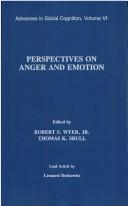
ISBN: 0805813268 0805813276 9780805813265 9780805813272 Year: 1993 Volume: 6 Publisher: Hillsdale Erlbaum
Abstract | Keywords | Export | Availability | Bookmark
 Loading...
Loading...Choose an application
- Reference Manager
- EndNote
- RefWorks (Direct export to RefWorks)
Anger --- Emotions --- Emotions and cognition --- Colère --- Emotions et cognition --- Colère
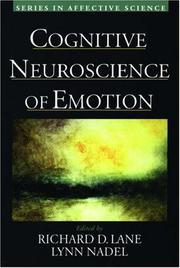
ISBN: 019511888X Year: 2000 Publisher: Oxford : Oxford university press,
Abstract | Keywords | Export | Availability | Bookmark
 Loading...
Loading...Choose an application
- Reference Manager
- EndNote
- RefWorks (Direct export to RefWorks)
Emotions and cognition --- Psychophysiology --- Emotions et cognition --- Psychophysiologie --- Emotions and cognition. --- Psychophysiology. --- Experimentele psychologie --- motivatie en emotie --- motivatie en emotie. --- État émotionnel --- Processus cognitif --- Émotions. --- Cognition.
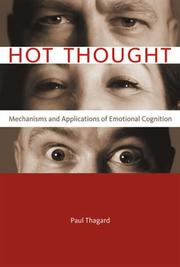
ISBN: 026220164X 0262701243 9786612098468 0262284847 1282098462 1429410027 9780262201643 0262303469 9780262284844 9781282098466 9780262701242 9781429410021 6612098465 9780262303460 Year: 2006 Publisher: Cambridge, Mass. MIT Press
Abstract | Keywords | Export | Availability | Bookmark
 Loading...
Loading...Choose an application
- Reference Manager
- EndNote
- RefWorks (Direct export to RefWorks)
"In Hot Thought, Paul Thagard describes the mental mechanisms - cognitive, neural, molecular, and social - that interact to produce different kinds of human thinking, from everyday decision making to legal reasoning, scientific discovery, and religious belief, and he discusses when and how thinking and reasoning should be emotional." "Thagard argues that an understanding of emotional thinking needs to integrate the cognitive, neural, molecular, and social levels. Many of the chapters employ computational models of various levels of thinking, including HOTCO (hot cognition) models and the more neurologically realistic GAGE model. Thagard uses these models to illuminate thinking in the domains of law, science, and religion, discussing such topics as the role of doubt and reasonable doubt in legal and other contexts, valuable emotional habits for successful scientists, and the emotional content of religious beliefs. Identifying and assessing the impact of emotion, Thagard argues, can suggest ways to improve the process of reasoning."--Jacket.
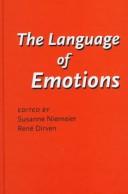
ISBN: 902722160X 1556195141 9786613174765 1283174766 9027283893 9789027221605 9789027283894 9781556195143 Year: 1997 Publisher: Amsterdam Benjamins
Abstract | Keywords | Export | Availability | Bookmark
 Loading...
Loading...Choose an application
- Reference Manager
- EndNote
- RefWorks (Direct export to RefWorks)
Since the celebration of the 100th anniversary of Darwin's The Language of the Emotions in Man and Animals (1872), emotionology has become a respectable and even thriving research domain again. The domain of human emotions is most important for mankind, emotions being right in the center of our daily lives and interests. A key-role in the interdisciplinary scientific debate about emotions has now been accorded to the study of the language of emotions.The present volume offers a new approach to the study of the language of emotions insofar as it presents theories from very differen
Langage et emotions --- Communication non-verbale (Psychologie) --- #SBIB:309H53 --- #SBIB:309H505 --- Niet-verbale communicatie --- Code en boodschap: psychologische, psycho-analytische benadering --- Psycholinguistics --- Sociolinguistics --- Emotions --- Emotions et cognition --- Communication interpersonnelle --- Aspect sociologique --- Emotions and cognition --- Interpersonal communication --- Body language --- Congresses --- Sociological aspects --- Congresses. --- Congrès --- Language and emotions --- Feelings --- Human emotions --- Passions --- Psychology --- Affect (Psychology) --- Affective neuroscience --- Apathy --- Pathognomy --- Cognition and emotions --- Cognition --- Emotions - Congres. --- Emotions et cognition - Congres. --- Emotions - Aspect sociologique - Congres. --- Langage et emotions - Congres. --- Communication interpersonnelle - Congres.
Book
ISBN: 047156690X 0471566918 9780471566908 Year: 1975 Publisher: New York
Abstract | Keywords | Export | Availability | Bookmark
 Loading...
Loading...Choose an application
- Reference Manager
- EndNote
- RefWorks (Direct export to RefWorks)
Cognitive psychology --- Affective and dynamic functions --- Cognition --- Emotions --- Emotions and cognition --- Human information processing --- Emotions et cognition --- Information, Traitement de l', chez l'homme --- 159.947 --- Information processing, Human --- Bionics --- Information theory in psychology --- Perception --- Cognition and emotions --- Psychologie van de wil. Wilskracht --- Emotions and cognition. --- Human information processing. --- 159.947 Psychologie van de wil. Wilskracht --- Cognition. --- Emotions.
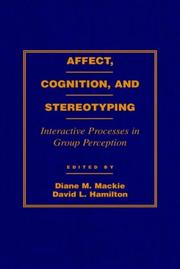
ISBN: 0124644104 1322053715 1493304380 0080885799 Year: 1993 Publisher: San Diego (Calif.): Academic press
Abstract | Keywords | Export | Availability | Bookmark
 Loading...
Loading...Choose an application
- Reference Manager
- EndNote
- RefWorks (Direct export to RefWorks)
Emotions and cognition --- Intergroup relations --- Prejudices --- Stereotypes (Social psychology) --- Emotions et cognition --- Relations intergroupes --- Préjugés --- Stéréotypes --- Stereotype (Psychology) --- Mental stereotypes --- Stereotyping (Social psychology) --- Social psychology --- Attitude (Psychology) --- Rigidity (Psychology) --- Bias (Psychology) --- Prejudgments --- Prejudice --- Prejudices and antipathies --- Emotions --- Conflict, Intergroup --- Intergroup conflict --- Relations, Intergroup --- Social interaction --- Cognition and emotions --- Cognition --- Préjugés --- Stéréotypes
Book
ISBN: 0333737458 Year: 2000 Publisher: Houndmills Macmillan Press
Abstract | Keywords | Export | Availability | Bookmark
 Loading...
Loading...Choose an application
- Reference Manager
- EndNote
- RefWorks (Direct export to RefWorks)
Bewustzijn --- Cogito --- Conscience (Psychophysiologie et philosophie) --- Consciousness --- Denken --- Emoties en cognitie --- Emotions and cognition --- Emotions et cognition --- Pensée --- Thought and thinking --- Coleridge, Samuel Taylor --- Knowledge --- Psychology --- Philosophy --- Poetry --- Psychological aspects --- Romanticism --- England --- Coleridge, Samuel Taylor, - 1772-1834 - Knowledge - Psychology. --- Coleridge, Samuel Taylor, - 1772-1834 - Philosophy.
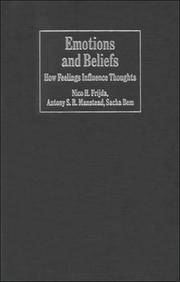
ISBN: 0521771382 0521787343 2735108791 9780521787345 9780521771382 9780511659904 0511659903 Year: 2000 Publisher: Cambridge Cambridge University Press
Abstract | Keywords | Export | Availability | Bookmark
 Loading...
Loading...Choose an application
- Reference Manager
- EndNote
- RefWorks (Direct export to RefWorks)
Few people would question nowadays that emotions influence beliefs but until recently little scientific research has been done on exactly how this effect takes place. This important new book, with contributions from some of the leading figures in the study of emotion, explores the relationship between emotions and beliefs from a number of different psychological perspectives. Combining theory with research, it seeks to develop coherent theoretical principles for understanding how emotions influence the content and strength of an individual's beliefs and their resistance or openness to modification. This book will prove an invaluable resource for all those interested in emotion.
Cognitive psychology --- Emotions and cognition --- Belief and doubt --- Emotions et cognition --- Croyance et doute --- Cognition and emotions --- Conviction --- Doubt --- Cognition --- Consciousness --- Credulity --- Emotions --- Knowledge, Theory of --- Philosophy --- Psychology --- Religion --- Will --- Agnosticism --- Rationalism --- Skepticism --- Health Sciences --- Psychiatry & Psychology --- Emotions and cognition. --- Belief and doubt.
Periodical
Abstract | Keywords | Export | Availability | Bookmark
 Loading...
Loading...Choose an application
- Reference Manager
- EndNote
- RefWorks (Direct export to RefWorks)
Cognition & Emotion is devoted to the study of emotion, especially to those aspects of emotion related to cognitive processes. The journal aims to bring together work on emotion undertaken by researchers in cognitive, social, clinical, and developmental psychology, neuropsychology, and cognitive science. Examples of topics appropriate for the journal include the role of cognitive processes in emotion elicitation, regulation, and expression; the impact of emotion on attention, memory, learning, motivation, judgements, and decisions; the interplay between cognition and emotion in psychopathology, social behaviour, and health-related behaviours; cultural, developmental, psychophysiological, and neuropsychological aspects of the relation between cognition and emotion; and the nature of particular emotions or emotionality in general. Cognition & Emotion publishes theoretical papers, original research reports, and literature reviews. Submissions can be considered for publication as regular articles or brief reports.
Psychology --- Cognition --- Emotions --- Emotions and cognition --- Emotions et cognition --- Periodicals. --- Périodiques --- Intelligence émotionnelle --- Périodiques. --- Cognition. --- Emotions and cognition. --- Emotions. --- Cognitive Science. --- Arts and Humanities --- Philosophy --- Neurology --- Psychiatry & Psychology --- Anthropology --- General and Others --- Sociology. --- Health Sciences --- Social Sciences --- Sociology --- Arts and Humanities. --- Health Sciences. --- Social Sciences. --- Psychology. --- Regret --- Feelings --- Emotion --- Feeling --- Regrets --- Cognitive Function --- Cognitions --- Cognitive Functions --- Function, Cognitive --- Functions, Cognitive --- Cognition and emotions --- Cognitive Sciences --- Science, Cognitive --- Sciences, Cognitive --- Cognitive Science
Book
ISBN: 9780262019958 9780262318419 9780262533768 0262318415 0262019957 0262318423 9780262318426 Year: 2014 Publisher: Cambridge, Mass. The MIT Press
Abstract | Keywords | Export | Availability | Bookmark
 Loading...
Loading...Choose an application
- Reference Manager
- EndNote
- RefWorks (Direct export to RefWorks)
In The Feeling Body, Giovanna Colombetti takes ideas from the enactive approach developed over the last twenty years in cognitive science and philosophy of mind and applies them for the first time to affective science -- the study of emotions, moods, and feelings. She argues that enactivism entails a view of cognition as not just embodied but also intrinsically affective, and she elaborates on the implications of this claim for the study of emotion in psychology and neuroscience. In the course of her discussion, Colombetti focuses on long-debated issues in affective science, including the notion of basic emotions, the nature of appraisal and its relationship to bodily arousal, the place of bodily feelings in emotion experience, the neurophysiological study of emotion experience, and the bodily nature of our encounters with others. Drawing on enactivist tools such as dynamical systems theory, the notion of the lived body, neurophenomenology, and phenomenological accounts of empathy, Colombetti advances a novel approach to these traditional issues that does justice to their complexity. Doing so, she also expands the enactive approach into a further domain of inquiry, one that has more generally been neglected by the embodied-embedded approach in the philosophy of cognitive science.
Cognitive psychology --- Philosophical anthropology --- Affective and dynamic functions --- Emotions and cognition. --- Affective neuroscience. --- Philosophy of mind. --- Emotions et cognition --- Neuroscience affective --- Philosophie de l'esprit --- Affective neuroscience --- Emotions and cognition --- Philosophy of mind --- Mind, Philosophy of --- Mind, Theory of --- Theory of mind --- Philosophy --- Cognitive science --- Metaphysics --- Cognition and emotions --- Cognition --- Neurobiology of emotion --- Neuroscience of emotions --- Physiology of emotion --- Neuropsychology --- Emotions --- PHILOSOPHY/Philosophy of Mind/General --- COGNITIVE SCIENCES/General
| Listing 1 - 10 of 12 | << page >> |
Sort by
|

 Search
Search Feedback
Feedback About UniCat
About UniCat  Help
Help News
News